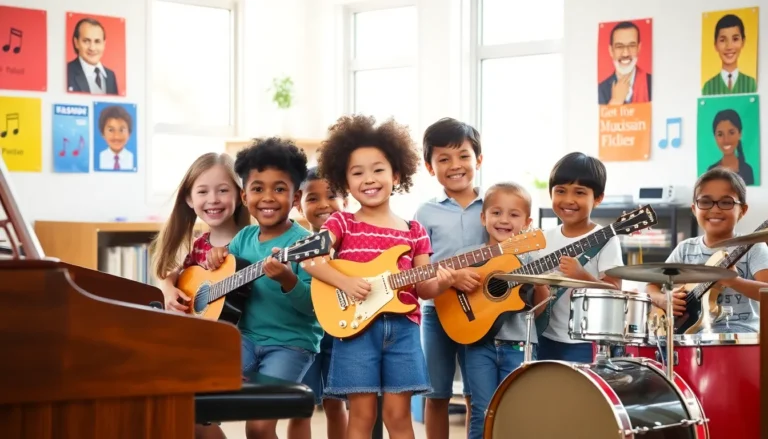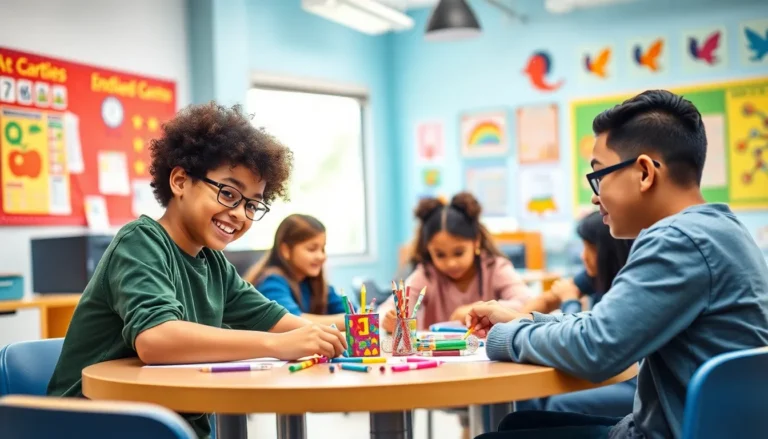In today’s fast-paced world, K12 courses are the secret sauce for a well-rounded education. They’re not just about hitting the books; they’re about unlocking the door to a treasure trove of knowledge. Imagine your child diving into subjects that spark curiosity and creativity while also preparing them for a future filled with possibilities.
Gone are the days of boring lectures and rote memorization. With engaging online platforms and innovative teaching methods, K12 courses make learning as exciting as a rollercoaster ride—minus the nausea! Whether it’s mastering math or exploring the wonders of science, these courses cater to every learner’s needs. So buckle up and get ready to discover how K12 courses can transform education into an adventure worth embarking on.
Table of Contents
ToggleOverview of K12 Courses
K12 courses encompass educational programs designed for students from kindergarten through 12th grade. These courses facilitate learning across various subjects, including math, science, language arts, and social studies. Numerous schools offer K12 courses in both online and traditional formats, accommodating diverse learning preferences.
Engagement remains a key feature of K12 courses. Innovative teaching methods and interactive online platforms capture students’ attention and promote active participation. Personalized learning paths allow students to progress at their own pace, ensuring mastery of concepts.
Moreover, flexibility characterizes K12 courses, providing options that fit individual schedules and lifestyles. Students can choose when and where to study, making education accessible for families with varying commitments. This flexibility can lead to improved academic performance and satisfaction.
K12 courses prepare students for future opportunities by equipping them with essential skills. Critical thinking, problem-solving, and collaboration emerge as core competencies cultivated through these programs. These skills serve students well, both in higher education and in their professional lives.
Schools continue to adopt K12 courses because of their effectiveness in fostering knowledge and creativity. By integrating technology into learning, these courses enhance students’ overall educational experience. They bridge the gap between traditional education and modern demands, ensuring that students receive a comprehensive and relevant education.
Benefits of K12 Courses

K12 courses offer significant advantages that enhance the educational experience. The ability to adapt learning environments to individual needs stands out as a key benefit.
Academic Flexibility
Academic flexibility allows students to choose when and where to study, promoting a balanced approach to learning. They can access materials and complete assignments at their convenience. This approach accommodates varying schedules, which is particularly beneficial for students involved in extracurricular activities. Flexibility also aids in managing multiple responsibilities while still prioritizing educational goals. Consequently, learners often report heightened engagement and interest in their studies, leading to improved academic outcomes.
Customized Learning Experience
A customized learning experience tailors education to individual student strengths and interests. Personalized pathways enable educators to identify challenges and adapt materials accordingly. Enrichment opportunities arise through personalized projects and resources that align with students’ goals. This targeted approach cultivates a deeper understanding of subjects, enhancing critical thinking skills. Schools utilizing customized formats often witness increased student satisfaction and motivation, resulting in a more fulfilling educational journey.
Types of K12 Courses
K12 courses come in various formats, catering to different learning styles and preferences. Each type offers unique benefits and opportunities for students.
Online Courses
Online courses provide students with the ability to learn anywhere and anytime. These programs utilize digital platforms, allowing access to a wide range of subjects. Interactive lessons often include videos, quizzes, and forums for discussion. Flexibility plays a crucial role since students can progress at their own pace. Engaging materials foster curiosity and deepen understanding of the subjects. Many online courses also offer support through virtual tutoring and resources, enhancing the overall learning experience.
Hybrid Courses
Hybrid courses combine in-person instruction with online learning components. Students participate in both classroom settings and virtual environments, promoting a balanced approach to education. This model allows for face-to-face interaction and access to digital resources simultaneously. Students benefit from collaborative projects and hands-on experiences alongside online assignments. Flexibility also allows students to adapt their study habits, ensuring they grasp course material more effectively. Ultimately, hybrid courses cater to diverse learning preferences, combining the best of traditional and modern educational methods.
Traditional Classroom Courses
Traditional classroom courses take place in physical school settings, emphasizing direct teacher-student interaction. Students engage in group discussions, hands-on activities, and real-time feedback from instructors. The social environment fosters teamwork and communication skills essential for personal development. Classroom settings typically offer structured schedules and promote discipline in learning. Teachers also provide direct supervision and assessment, ensuring students grasp important concepts. Traditional courses often appeal to those who thrive in structured environments, enriching their educational journey through personal connection and immediate support.
Choosing the Right K12 Course
Choosing the right K12 course involves understanding both student needs and course quality.
Assessing Student Needs
Identifying individual learning preferences is crucial. Some students thrive in interactive environments while others prefer self-paced study. Academic strengths also play a significant role in course selection. For example, a student excelling in math may benefit from advanced math courses. Furthermore, personal interests should guide selections. A passion for the arts may lead to enrolling in creative courses. Flexibility in scheduling accommodates varied commitments, so it’s key to factor in the student’s lifestyle. Ultimately, aligning course choices with these assessments enhances the educational experience.
Evaluating Course Quality
Quality assurance in K12 courses is essential for effective learning. Accreditation status indicates a course’s legitimacy and adherence to educational standards. Reviews and testimonials provide insights into student experiences. High-quality courses incorporate interactive elements that engage learners actively. Additionally, resources available during the course, such as tutor support and learning materials, contribute to overall effectiveness. Reviewing curriculum alignment with state standards ensures educational relevance. These factors collectively determine the suitability and impact of a K12 course on student performance.
K12 courses represent a transformative approach to education that caters to the diverse needs of today’s learners. By combining flexibility with innovative teaching methods, these programs empower students to take charge of their learning journey. The ability to tailor education to individual strengths and interests not only enhances engagement but also prepares students for future success.
As schools continue to embrace K12 courses, the potential for fostering curiosity and creativity in students grows. This evolution in education promises to equip the next generation with essential skills needed in an ever-changing world. With the right K12 course, students can embark on an enriching educational adventure that shapes their academic and professional futures.





